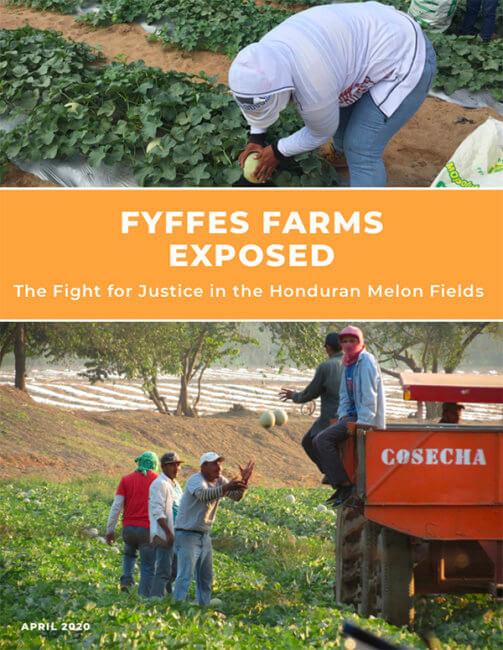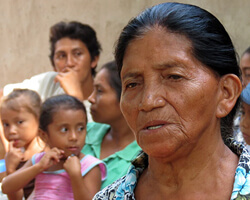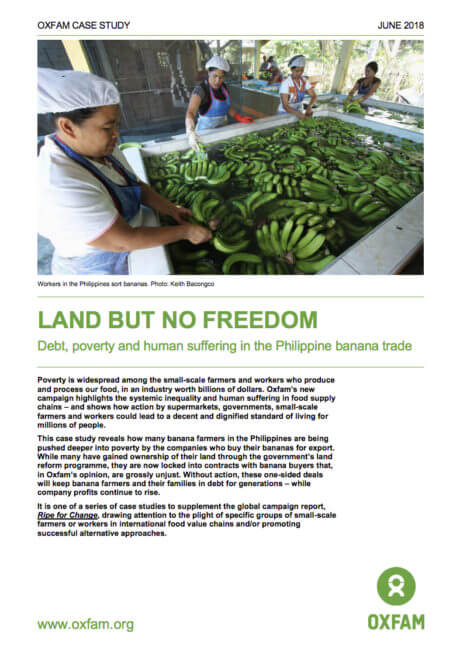The Freedom and Fairness for Fyffes workers! campaign is calling on Fyffes – the number one importer of bananas to Europe, and among the largest global marketer for Supersweet pineapples and winter season melons – to respect the rights of workers in its global supply chains.
Freedom & Fairness for Fyffes Workers
Home » Trade Unions » Freedom & Fairness for Fyffes Workers
Latest Developments
Fyffes membership of the Ethical Trading Initiative terminated
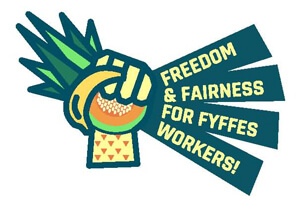
The Ethical Trading Initiative (ETI) has announced that they have terminated the membership of Fyffes, as a result of the company’s failure to respect the ETI Base Code, an internationally recognised set of labour standards based on ILO Conventions.
Fyffes was initially suspended by the ETI following formal complaints, made under ETI’s complaints procedure, by Banana Link and the International Union of Foodworkers (IUF) in March 2016. These concerned the treatment of workers at Fyffes’ subsidiary in Honduras – Suragroh – in particular the failure to respect the right of workers to join an independent trade union.
Banana Link had hoped that the mediations, at the behest of ETI, would have brought a successful resolution to the dispute. We are hugely disappointed that this mediation has not proved successful, and that ETI have been left with no option but to terminate Fyffes’ membership of the ETI.
Banana Link will continue to press Fyffes to respect labour rights throughout their global supply chains and will continue, in solidarity with the independent trade union, Sindicato de Trabajadores de la Agroindustria y Similares (STAS), to ask that Fyffes adhere to the agreement they signed on 11 January 2019 to reinstate sacked union members and collectively bargain with STAS for better wages and conditions.
We would also encourage customers of Fyffes to encourage the company to adhere to the agreement they signed with STAS.
Banana Link
25 March 2019
New Report Exposes Toxic Chemicals, Human Rights Abuses on Fyffes Melon Farms
A joint report by the International Labor Rights Forum, Fair World Project, and the International Union of Food Workers (IUF) Latin America Regional Secretariat, with support from 3F International, published today reveals long-term, ongoing human and labor rights violations on Fyffes’ melon plantations in Honduras. The report, Fyffes Farms Exposed: The Fight for Justice in the Honduran Melon Fields, calls on the company to take responsibility to remedy injustices at their farms and commit to a legally-binding, enforceable agreement to uphold workers’ rights.
April 2020
Serious Abuses of Labour Rights in Costa Rica and Honduras
Since the summer of 2015, the Make Fruit Fair! campaign has collected evidence of very serious violations of core labour standards at specific Fyffes’ subsidiaries; ANEXCO in Costa Rica and Suragroh and Melon Export SA in Honduras, where a largely female workforce, reliant on temporary seasonal work, is particularly vulnerable.
These violations include: failure to pay minimum wages and social insurance (an estimated £2.5m in pay and social insurance has been withheld); exposure of workers to hazardous agrochemicals; failure to respect freedom of association including threats, harassment and sacking of union members; and blocking collective bargaining processes.
“They never contributed to social insurance and now I will not be able to retire or finally rest after so many years spent on the plantations. I have to continue looking for work to survive.” – Maria Gomez (65) who worked for nearly 30 years as a supervisor at Melon Export SA
In the case of Suragroh, Banana Link and the International Union of Foodworkers (IUF) has alleged breaches of the UK’s Ethical Trading Initiative Base Code for failure to respect unions and pay living wages, and has refused to participate in local mediation to remedy these.
The Honduran Labour Inspectorate has also found non-payment of minimum wages and other statutory benefits. Additionally, a 2015 report by the U.S. Department of Labor confirmed allegations that Suragroh failed to pay the minimum wage, among a lengthy list of other violations.
Workers are required to provide their own work equipment such as hoes, machetes and shoes, the costs of which can amount to an entire week’s income.
Workers are also exposed to hazardous chemicals, many reporting headaches, sickness and temperatures as a result, and report a lack of information about and training to avoid and be protected from the dangers of chemical exposure. In December 2015, about 100 women suffered poisoning, 14 of whom were hospitalised, after they were accidentally dropped off downwind of herbicide and chlorine spraying in an adjoining plot.
“Fyffes in Honduras does not respect the fundamental rights of women workers, the majority of employees are women who have up to 26 years of work without social security rights or social benefits. We demand respect for freedom of association and collective bargaining.” – Iris Munguia, Coordinator, COLSIBA (the Regional Coordination of Latin American Banana & Agro-Industrial Workers’ Unions)
Meanwhile, at ANEXCO, dialogue facilitated by the Costa Rican Ministry of Labour has failed to provide a space in which local unions can negotiate with ANEXCO management and Fyffes, and the local unions report continued failure to comply with core labour standards enshrined in Costa Rican legislation.
The rights abuses at ANEXCO were the subject of a Make Fruit Fair urgent action launched in September 2015. The key demands of respect for labour rights and an end to harassment and discrimination against union members have yet to be met.
Both cases clearly illustrate that Fyffes is also in breach of OECD Guidelines for Multinational Enterprises for the failure to “Respect the right of their employees to be represented by trade unions“.
Video: Workers at Fyffes owned Melon Plantation in Honduras talking about labour rights violations
Time To Take Responsibility
No company, especially a company that professes to respect the UN Guiding Principles on Business and Human Rights, should benefit from the appalling abuses suffered by those at the bottom of their supply chain.
“Fyffes must take responsibility for ensuring that their local managements in Costa Rica and Honduras recognise and enter into good faith negotiations with local unions and that company-wide freedom of association and collective bargaining is respected at every level.“ – Ron Oswald, General Secretary, International Union of Foodworkers
An alliance of civil society organisations and trade unions, including unions in Costa Rica and Honduras, are calling on Fyffes to ensure that local plantation management
- ends the discrimination of union members at Anexco (Costa Rica) and Suragroh (Honduras)
- recognises unions at both Anexco (Costa Rica) and Suragroh (Honduras) and engages in collective bargaining with these unions to provide opportunity for workers to be represented in negotiations on pay and working conditions on plantations.
We are also calling for shareholders and directors with responsibility for Fyffes to establish and implement a global company wide policy to ensure the respect of workers’ rights throughout its supply chains, including the right to join an independent trade union and for unions to engage in collective bargaining.
“No payment of the minimum wage, overtime and vacations. We notified all these infractions so that they could be corrected and sent the minutes to Tegucigalpa.” – Eder Chavarría – Demoted after seven years, from chief inspector at the Choluteca Regional Labor Office for fulfilling his duty and pointing out all the violations of labor and trade union rights committed in the melon plantations owned by Fyffes.
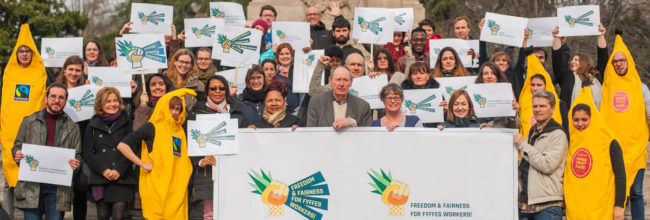
Video: Iris Munguia talks to Banana Link about the importance of international support to the mainly women workers facing labour rights violations at subsidiaries of Fyffes in Honduras
Fyffes New Owners
In the course of the campaign, Fyffes was taken over the Japanese Sumitomo Corporation.
At the Fyffes EGM in Dublin in 2017, at which shareholders voted to accept their bid, senior vice-president and general manager of Sumitomo’s food business group, Ted Eguchi, committed the new owners to addressing the issues raised by our campaign, saying:
“Obviously when you are in the farming business, you do have those issues. But we have to . . . make sure we do the right thing and we’ll look into what they’re asking for and what they’re protesting about. And if there are things that need to change, they’ll change.”
Sumifru, the banana producing subsidiary of the Sumitomo corporation, is reported to have up to 30,000 employees in its production and trading operations in the Philippines, supplying 30% of the Japanese banana market and their largest plantation near Davao City covers a full 10,000 hectares.
However, despite its branded banana success in Japan, Sumifru has a pretty unenviable reputation in the Philippines on key issues of labour relations, working conditions and occupational health and safety. It even has its own ‘anti-body’ of trade unions, small growers and civil society organisations specially devoted to trying to rectify the company’s alleged violations of national labour laws. The Banana Industry Growers and Workers Alliance against Sumifru – BIGWAS – has, over the last couple of years, been very vocal in highlighting what they consider to be an attitude of laissez-faire and anti-worker practices.
Armed Attack On Trade Union Organiser

‘It is clear that Fyffes’ persistent failure to ensure that fundamental workers rights are respected at Melon Export has created a vehemently anti union culture in which this attack has taken place. We have documented the failure to enable workers to exercise their rights to freedom of association and collective bargaining at other Fyffes subsidiaries and suppliers. Until this changes we fear for the safety of the women and men who bravely defend the rights of their fellow workers.’ Jacqui Mackay, Banana Link’s National Coordinator“We are horrified by this attack that comes after unions and workers´ rights activists around the world have exposed the abuses of Fyffes in their melon plantations in Honduras. The ITUC has been and will continue to support Moises and the STAS union in their legitimate demands to be treated with dignity”. Sharan Burrow, International Trade Union Confederation General Secretary
“This horrific attack is just the latest assault on the rights of STAS to organize melon workers for decent wages and working conditions.” Judy Gearhart, Executive Director of the International Labor Rights Forum
The Inter-American Commission on Human Rights (IACHR) urges the State of Honduras to take all necessary measures to guarantee that union leaders can carry out their work of denunciation, monitoring, and protection, free from acts of violence that may endanger their life, integrity, and safety.
“While there is no evidence to suggest that Fyffes is directly linked to the attack, GMB says that their aggressive anti-union stance engenders a hostile atmosphere in one of the world’s most violent places.“ GMB International Officer, Bert Schouwenburg
Resources
Tomas Membreño, President of the STAS trade union, representing workers sacked at Fyffes’ subsidiary in Honduras for joining the union, recently spoke to Banana Link about the violations of labour rights at the company, the plight of the sacked workers, the importance of international support for their campaign, and their hopes now that Fyffes has been suspended by the UK Government’s Ethic Trading Initiative as a result.
